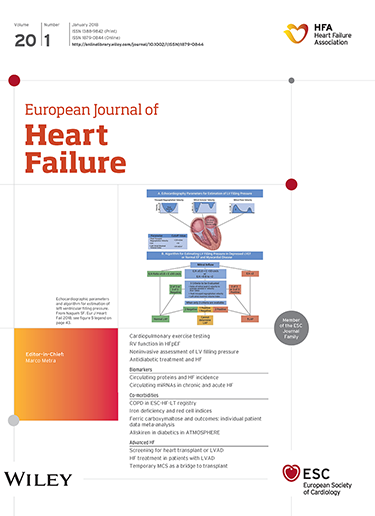Randomized investigation of heart failure therapy in patients with advanced cancer at risk of cardiac wasting: Rationale and design of the EMPATICC trial
IF 10.8
1区 医学
Q1 CARDIAC & CARDIOVASCULAR SYSTEMS
引用次数: 0
Abstract
AimsEnd‐stage cancer may resemble a heart failure (HF)‐like phenotype marked by cardiac wasting, dysfunction, and symptoms such as dyspnoea, congestion, and impaired physical function. The EMPATICC (EMPower the heArt of patients with TermInal Cancer using Cardiac medicines) trial evaluates the safety and efficacy of optimized HF therapy in patients with advanced cancer to improve self‐care ability.MethodsEMPATICC is a multicentre, investigator‐initiated, randomized, double‐blind, controlled, proof‐of‐concept trial employing a joint cardio‐oncology care approach. Patients were randomized 1:1 to optimized HF therapy (sacubitril/valsartan, empagliflozin, ivabradine, ferric carboxymaltose) plus usual care, or usual care alone, for 30 days, followed by a 30‐day open‐label extension. Eligible patients had stage IV solid tumours (per Union for International Cancer Control), were receiving palliative care, had a 1–6 month life expectancy, and were on optimized analgesia. At baseline, first patients had to meet ≥2 criteria of the following indicating cardiovascular risk: heart rate ≥70 bpm, N‐terminal pro‐B‐type natriuretic peptide ≥600 pg/ml, elevated high‐sensitivity troponin, left ventricular ejection fraction <55%, left ventricular mass loss >15%, transferrin saturation <20%, or moderate/high likelihood of HF with preserved ejection fraction (based on the HFA‐PEFF score); and they had to meet at least one criterion of the following indicating functional limitation: ≥6 s to walk 4 m, inability to wash ≥3 days of the last 7 days, or symptoms of dyspnoea at rest. Enrolment ended 30 January 2025; 93 patients completed randomization. The primary endpoint is a hierarchical composite (analysed by win ratio): (1) days alive and able to wash, (2) 4 m walking ability, and (3) patient global assessment of well‐being.ConclusionsEMPATICC evaluates whether HF therapy can improve function and well‐being in advanced cancer, potentially reshaping care in this population.有心脏衰竭风险的晚期癌症患者心衰治疗的随机研究:EMPATICC试验的基本原理和设计
AimsEnd期癌症可能类似于心力衰竭(HF)样表型,其特征是心脏消耗、功能障碍以及呼吸困难、充血和身体功能受损等症状。EMPATICC(使用心脏药物增强晚期癌症患者的心脏功能)试验评估了优化的心衰治疗对晚期癌症患者的安全性和有效性,以提高自我护理能力。方法sempaticc是一项多中心、研究者发起、随机、双盲、对照、概念验证的临床试验,采用心血管-肿瘤联合治疗方法。患者以1:1的比例随机接受优化的HF治疗(沙比利/缬沙坦、恩格列嗪、伊伐布雷定、三羧基麦糖铁)加常规治疗或单独常规治疗30天,然后进行30天的开放标签延长治疗。符合条件的患者患有IV期实体肿瘤(根据国际癌症控制联盟),正在接受姑息治疗,预期寿命为1-6个月,并使用优化的镇痛药。在基线时,第一个患者必须满足以下心血管风险≥2个标准:心率≥70 bpm, N -末端前B型利钠肽≥600 pg/ml,高敏感性肌钙蛋白升高,左心室射血分数55%,左心室质量损失15%,转铁蛋白饱和度20%,或中度/高度可能发生HF并保留射血分数(基于HFA - PEFF评分);他们必须满足以下至少一项表明功能限制的标准:≥6秒行走4米,在最后7天中≥3天不能洗澡,或休息时出现呼吸困难症状。报名截止到2025年1月30日;93例患者完成随机分组。主要终点是一个分层复合指标(通过胜率分析):(1)存活天数和洗涤能力,(2)4米行走能力,(3)患者总体健康评估。sempaticc评估了HF治疗是否可以改善晚期癌症患者的功能和幸福感,并有可能重塑这一人群的护理。
本文章由计算机程序翻译,如有差异,请以英文原文为准。
求助全文
约1分钟内获得全文
求助全文
来源期刊

European Journal of Heart Failure
医学-心血管系统
CiteScore
27.30
自引率
11.50%
发文量
365
审稿时长
1 months
期刊介绍:
European Journal of Heart Failure is an international journal dedicated to advancing knowledge in the field of heart failure management. The journal publishes reviews and editorials aimed at improving understanding, prevention, investigation, and treatment of heart failure. It covers various disciplines such as molecular and cellular biology, pathology, physiology, electrophysiology, pharmacology, clinical sciences, social sciences, and population sciences. The journal welcomes submissions of manuscripts on basic, clinical, and population sciences, as well as original contributions on nursing, care of the elderly, primary care, health economics, and other related specialist fields. It is published monthly and has a readership that includes cardiologists, emergency room physicians, intensivists, internists, general physicians, cardiac nurses, diabetologists, epidemiologists, basic scientists focusing on cardiovascular research, and those working in rehabilitation. The journal is abstracted and indexed in various databases such as Academic Search, Embase, MEDLINE/PubMed, and Science Citation Index.
 求助内容:
求助内容: 应助结果提醒方式:
应助结果提醒方式:


